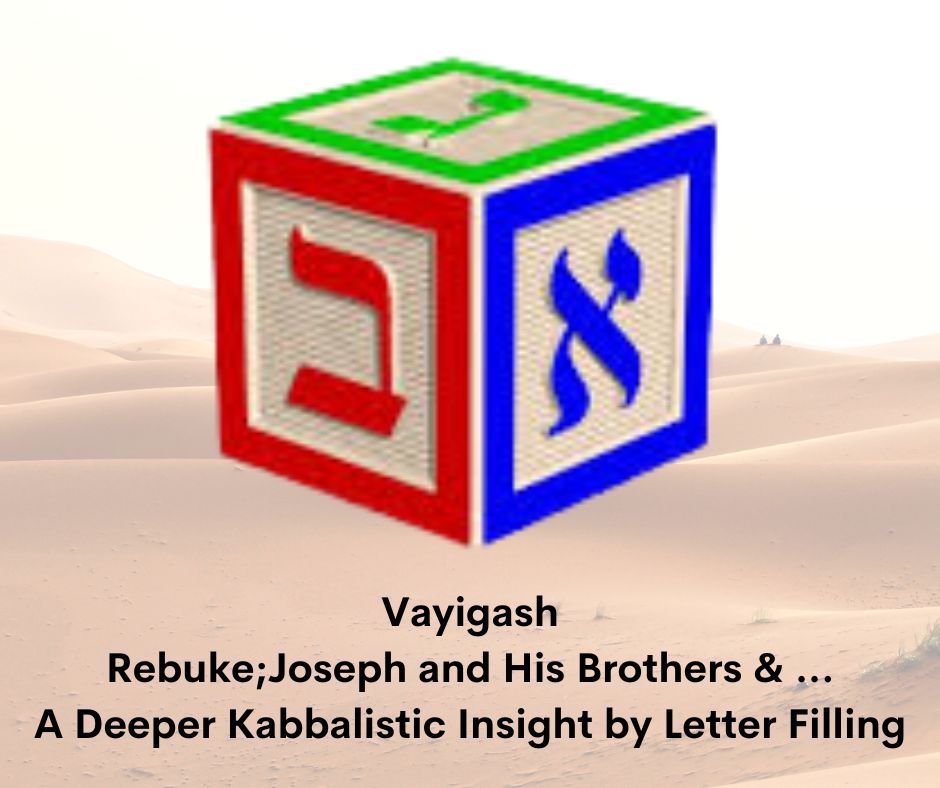
09 Dec Vayigash; Rebuke- Joseph and His Brothers & A Deeper Kabbalistic Insight by Letter Filling
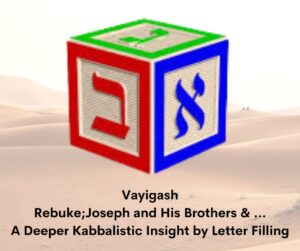
When giving rebuke, it is important to get to know the person, to bring them close in order to know the kindest and most effective way to deliver the message.
It is a machlokas (controversy) whether or not we should give rebuke to another. The main reason for refraining from rebuke is that there is a concern of a lack of sensitivity of our fellow and thus a great risk of causing harm. Where there is a concern of giving rebuke we should seek advice from an Orthodox Rabbi.
In parshas Vayigash we see a most subtle, sensitive and considerate way of giving rebuke when Joseph reveals himself to his brothers and says “I am Joseph. Is my Father still alive”?
Now Joseph had known his father was alive as the brothers had just told him previously in parsha Mikeitz. However, the first time he asks if his father is alive is for himself, his own edification, yet he still repeats the question a second time.., and here’s why;
The second time Joseph repeats the question (Is my Father still alive?), the brothers have just discovered that their brother Joseph is alive , he is the most powerful man in Egypt, and their fate is in his hands. They are certainly in an extreme state of vulnerability and a deepening fear as they are wholly consciousness of the events of what they did to their brother Joseph the past. So when Joseph asks the second time ‘Is my father still alive’, the question now takes on a different and deeper meaning.
It brings into focus not just the event of Joseph being separated out from the family, but the question ‘Is my Father still alive ‘ brings focus on the sorrow the brothers had brought upon their father having told their father Jacob the story of his son Joseph being killed. In other words the question is also a statement …. ‘Is my father still alive… given the grief that you have caused him’?
Thus, rebuke is given in a subtle way, out of loving kindness not might to help the brothers recognize their transgressive ways with the ultimate goal of Unity. The most effective rebuke tends to be when someone comes to understand for themselves that they have done something wrong and chooses to make change…tshuvah.
Bringing someone close… to ‘receive’ another to help them understand a situation to make change is different than ‘telling’ them.
Like transferring a flame to light a candle, we don’t touch the wicks to one another, but allow the new candle to gently receive and accept the flame by holding them closes yet not touching. We hold them in place until both flames grow tall and strong and can be independent.
These events were essential in order that the 12 Tribes as the Nation of Israel become aware of the tshuvah that was necessary to be ‘reborn’ pure.
It may merit repeating that engaging in rebuke is a very sensitive and as much as it is meant to be done for the purpose of elevation may be a potentially damaging thing to do. Some recommend that it should not be done (in our time). If there is a concern regarding rebuke it is recommended to talk to a Rav.
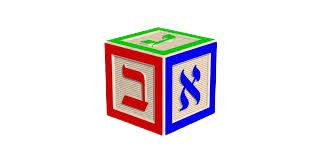
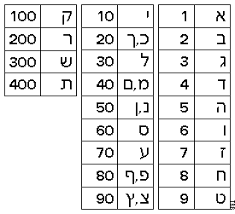 Gematria Chart
Gematria Chart
NB; There are 9 basic categories to begin understanding the Hebrew letters. Only 1 of these 9 categories is its numerical value. Numerical values of letters, words and phrases may be determined by various mesorah -traditional methods. (see Rav Y. Ginsburgh, ‘The Hebrew Letters’)
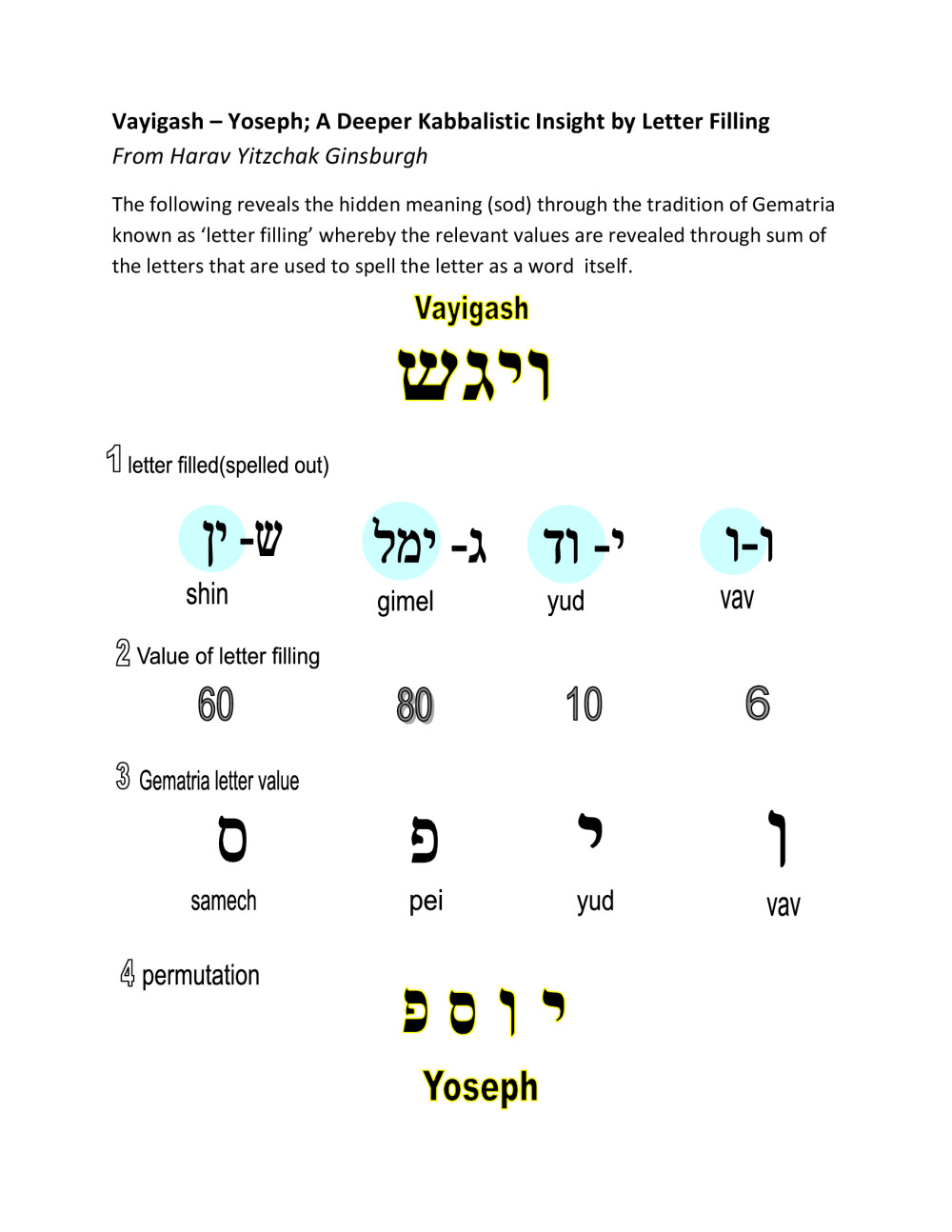
Additional:
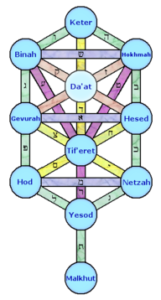 A beautiful (basic) example of the inherent symmetry of Creation of the sefirot,
A beautiful (basic) example of the inherent symmetry of Creation of the sefirot,
and the Torah and it’s letters, can be seen in the illustration of the 22 letters
of the aleph beit and their connections between the sefirot.
Leib Getzel (Lawrence) Lax
Addictions and Counseling
lawrencelax.com
lawrenceJlax@gmail.com